A Report on the Impact of COVID-19 on the UK Tourism and Hospitality
VerifiedAdded on 2023/06/11
|10
|2608
|242
Report
AI Summary
This report examines the significant negative impact of the COVID-19 pandemic on the UK's tourism and hospitality industry, leading to closures, reduced revenue, and decreased GDP. The industry faced challenges such as unemployment, reduced customer spending, and strict government restrictions. Hoteliers and tourism operators adapted by implementing contactless services, offering workspace solutions, and leveraging technology like robotics to enhance safety and efficiency. These strategies aimed to mitigate the pandemic's effects, maintain customer engagement, and ensure health and hygiene standards, ultimately contributing to the industry's gradual recovery and adaptation to the new normal, with a focus on health, hygiene, and innovative service delivery to regain customer trust and improve market position.
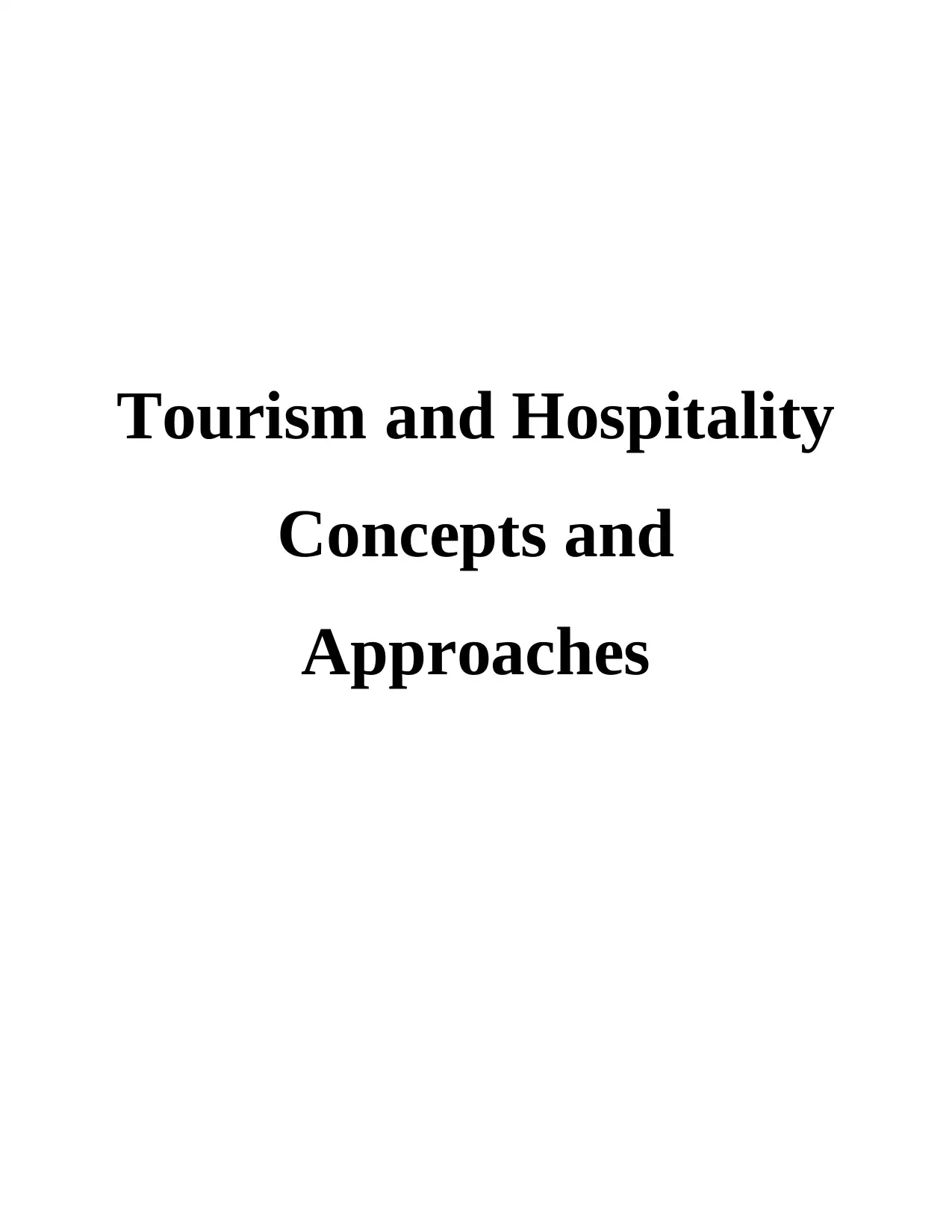
Tourism and Hospitality
Concepts and
Approaches
Concepts and
Approaches
Paraphrase This Document
Need a fresh take? Get an instant paraphrase of this document with our AI Paraphraser
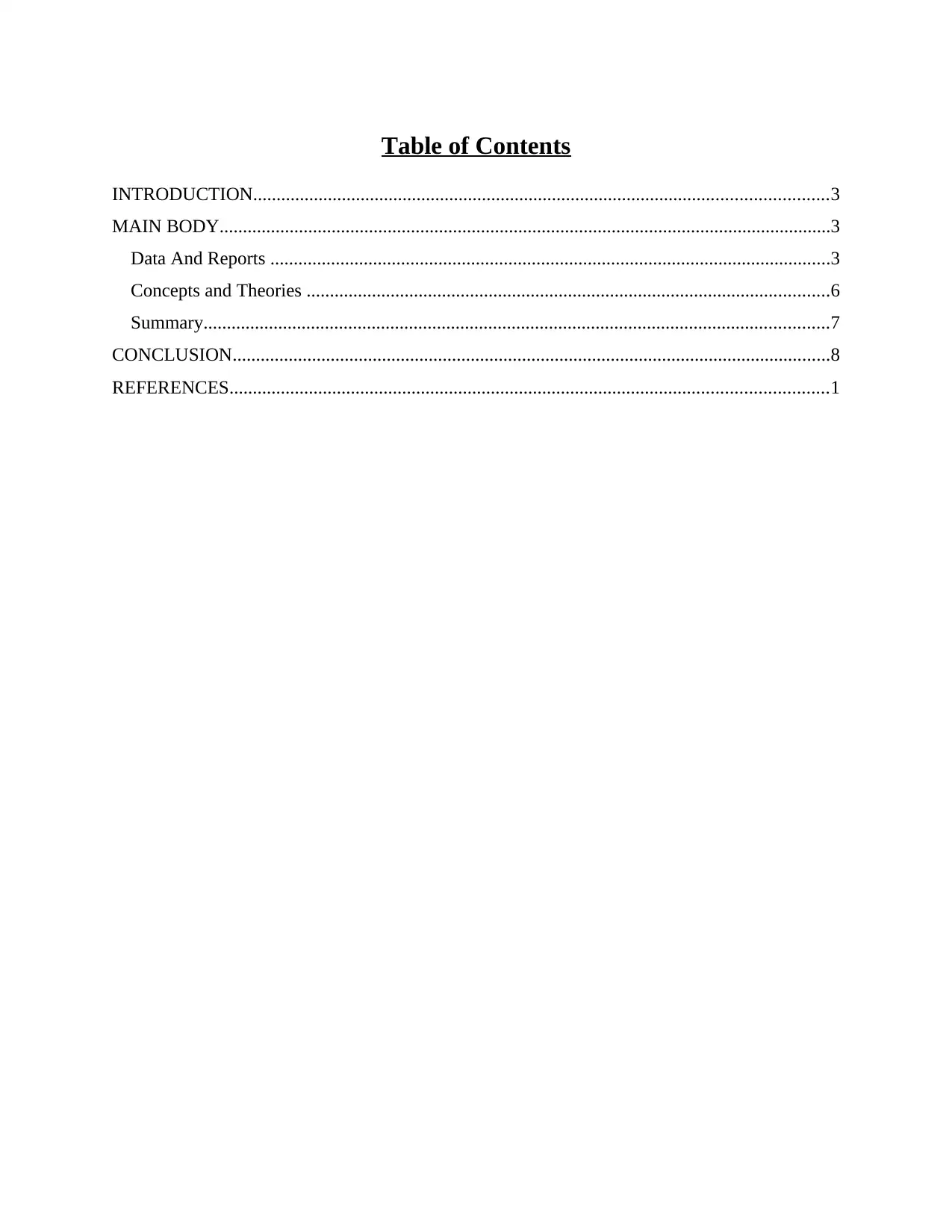
Table of Contents
INTRODUCTION...........................................................................................................................3
MAIN BODY...................................................................................................................................3
Data And Reports ........................................................................................................................3
Concepts and Theories ................................................................................................................6
Summary......................................................................................................................................7
CONCLUSION................................................................................................................................8
REFERENCES................................................................................................................................1
INTRODUCTION...........................................................................................................................3
MAIN BODY...................................................................................................................................3
Data And Reports ........................................................................................................................3
Concepts and Theories ................................................................................................................6
Summary......................................................................................................................................7
CONCLUSION................................................................................................................................8
REFERENCES................................................................................................................................1
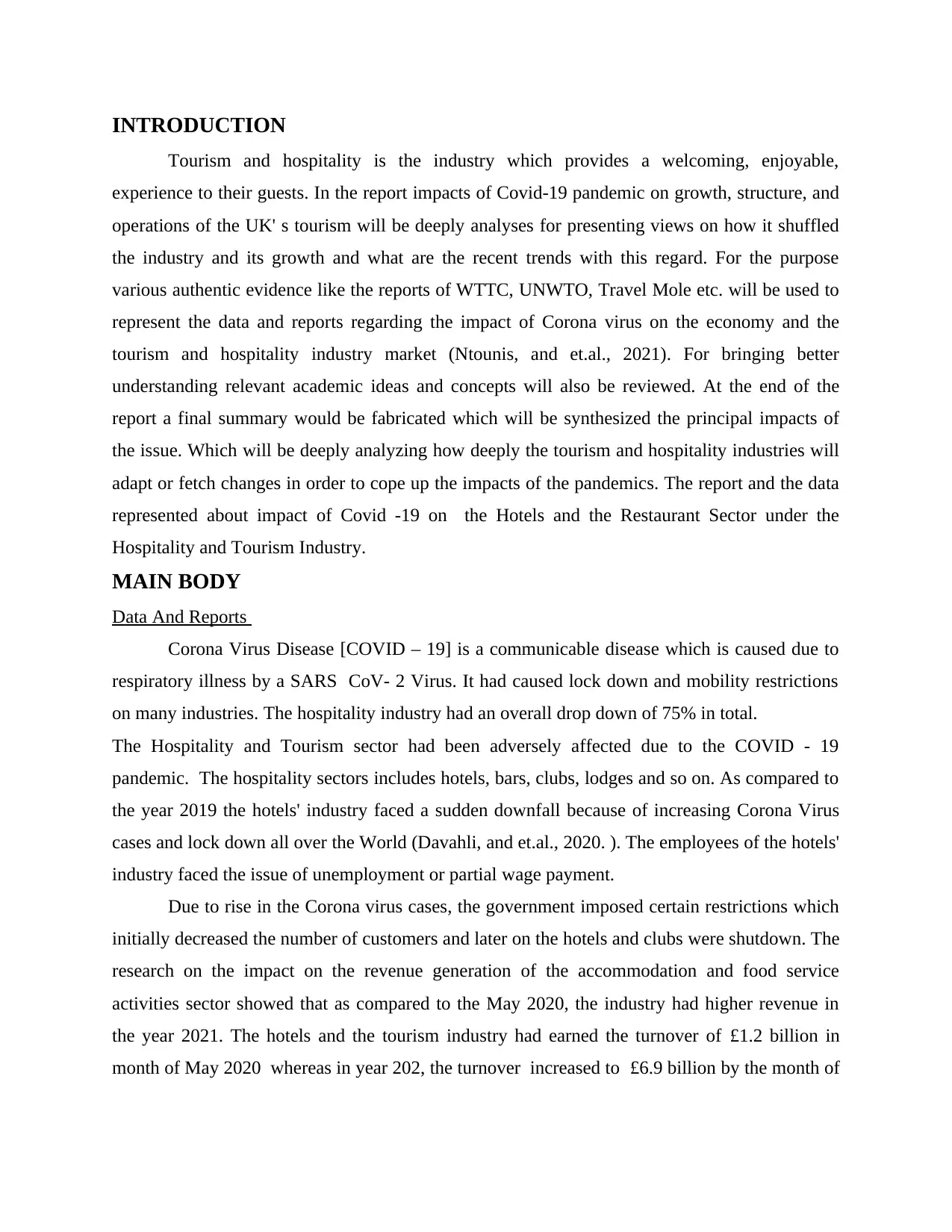
INTRODUCTION
Tourism and hospitality is the industry which provides a welcoming, enjoyable,
experience to their guests. In the report impacts of Covid-19 pandemic on growth, structure, and
operations of the UK' s tourism will be deeply analyses for presenting views on how it shuffled
the industry and its growth and what are the recent trends with this regard. For the purpose
various authentic evidence like the reports of WTTC, UNWTO, Travel Mole etc. will be used to
represent the data and reports regarding the impact of Corona virus on the economy and the
tourism and hospitality industry market (Ntounis, and et.al., 2021). For bringing better
understanding relevant academic ideas and concepts will also be reviewed. At the end of the
report a final summary would be fabricated which will be synthesized the principal impacts of
the issue. Which will be deeply analyzing how deeply the tourism and hospitality industries will
adapt or fetch changes in order to cope up the impacts of the pandemics. The report and the data
represented about impact of Covid -19 on the Hotels and the Restaurant Sector under the
Hospitality and Tourism Industry.
MAIN BODY
Data And Reports
Corona Virus Disease [COVID – 19] is a communicable disease which is caused due to
respiratory illness by a SARS CoV- 2 Virus. It had caused lock down and mobility restrictions
on many industries. The hospitality industry had an overall drop down of 75% in total.
The Hospitality and Tourism sector had been adversely affected due to the COVID - 19
pandemic. The hospitality sectors includes hotels, bars, clubs, lodges and so on. As compared to
the year 2019 the hotels' industry faced a sudden downfall because of increasing Corona Virus
cases and lock down all over the World (Davahli, and et.al., 2020. ). The employees of the hotels'
industry faced the issue of unemployment or partial wage payment.
Due to rise in the Corona virus cases, the government imposed certain restrictions which
initially decreased the number of customers and later on the hotels and clubs were shutdown. The
research on the impact on the revenue generation of the accommodation and food service
activities sector showed that as compared to the May 2020, the industry had higher revenue in
the year 2021. The hotels and the tourism industry had earned the turnover of £1.2 billion in
month of May 2020 whereas in year 202, the turnover increased to £6.9 billion by the month of
Tourism and hospitality is the industry which provides a welcoming, enjoyable,
experience to their guests. In the report impacts of Covid-19 pandemic on growth, structure, and
operations of the UK' s tourism will be deeply analyses for presenting views on how it shuffled
the industry and its growth and what are the recent trends with this regard. For the purpose
various authentic evidence like the reports of WTTC, UNWTO, Travel Mole etc. will be used to
represent the data and reports regarding the impact of Corona virus on the economy and the
tourism and hospitality industry market (Ntounis, and et.al., 2021). For bringing better
understanding relevant academic ideas and concepts will also be reviewed. At the end of the
report a final summary would be fabricated which will be synthesized the principal impacts of
the issue. Which will be deeply analyzing how deeply the tourism and hospitality industries will
adapt or fetch changes in order to cope up the impacts of the pandemics. The report and the data
represented about impact of Covid -19 on the Hotels and the Restaurant Sector under the
Hospitality and Tourism Industry.
MAIN BODY
Data And Reports
Corona Virus Disease [COVID – 19] is a communicable disease which is caused due to
respiratory illness by a SARS CoV- 2 Virus. It had caused lock down and mobility restrictions
on many industries. The hospitality industry had an overall drop down of 75% in total.
The Hospitality and Tourism sector had been adversely affected due to the COVID - 19
pandemic. The hospitality sectors includes hotels, bars, clubs, lodges and so on. As compared to
the year 2019 the hotels' industry faced a sudden downfall because of increasing Corona Virus
cases and lock down all over the World (Davahli, and et.al., 2020. ). The employees of the hotels'
industry faced the issue of unemployment or partial wage payment.
Due to rise in the Corona virus cases, the government imposed certain restrictions which
initially decreased the number of customers and later on the hotels and clubs were shutdown. The
research on the impact on the revenue generation of the accommodation and food service
activities sector showed that as compared to the May 2020, the industry had higher revenue in
the year 2021. The hotels and the tourism industry had earned the turnover of £1.2 billion in
month of May 2020 whereas in year 202, the turnover increased to £6.9 billion by the month of
⊘ This is a preview!⊘
Do you want full access?
Subscribe today to unlock all pages.

Trusted by 1+ million students worldwide
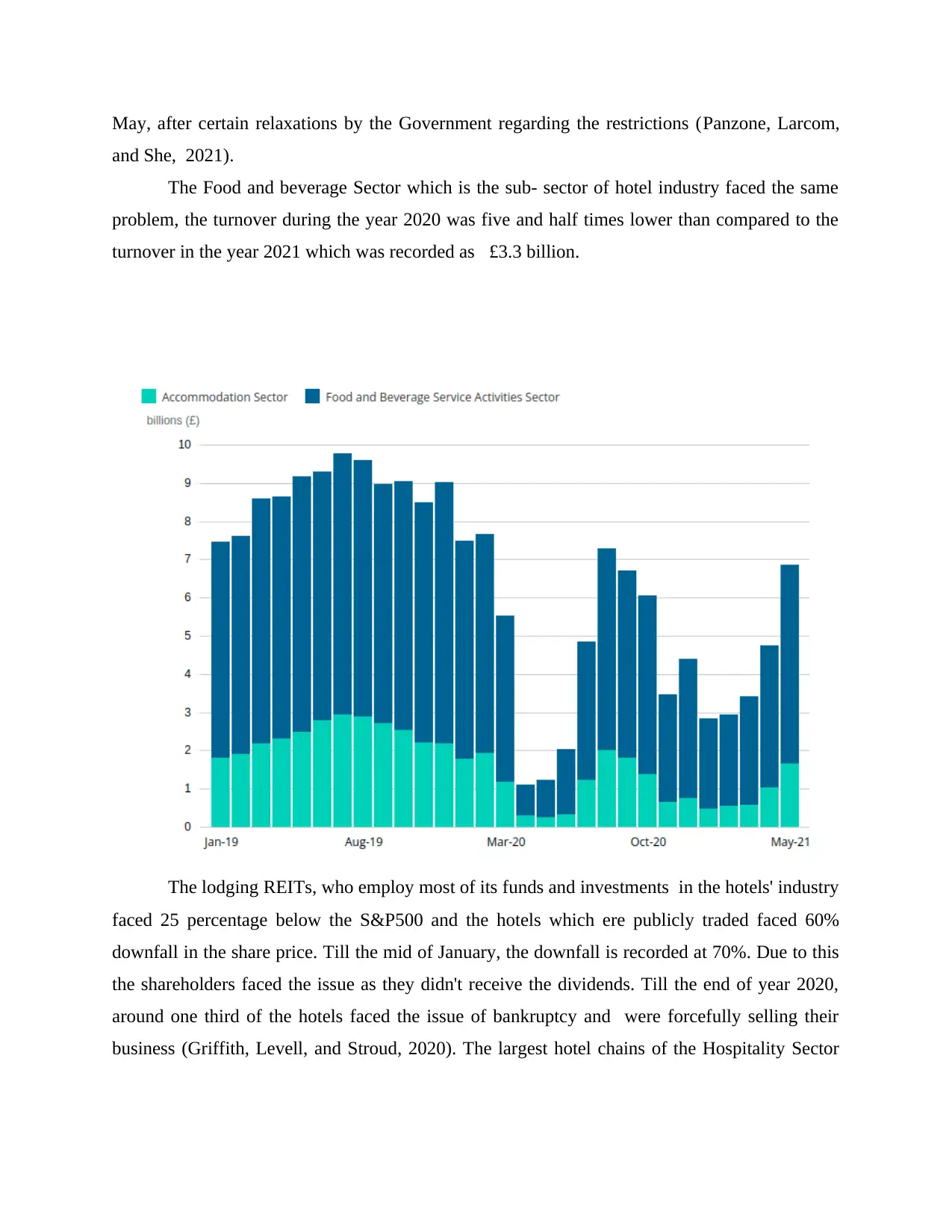
May, after certain relaxations by the Government regarding the restrictions (Panzone, Larcom,
and She, 2021).
The Food and beverage Sector which is the sub- sector of hotel industry faced the same
problem, the turnover during the year 2020 was five and half times lower than compared to the
turnover in the year 2021 which was recorded as £3.3 billion.
The lodging REITs, who employ most of its funds and investments in the hotels' industry
faced 25 percentage below the S&P500 and the hotels which ere publicly traded faced 60%
downfall in the share price. Till the mid of January, the downfall is recorded at 70%. Due to this
the shareholders faced the issue as they didn't receive the dividends. Till the end of year 2020,
around one third of the hotels faced the issue of bankruptcy and were forcefully selling their
business (Griffith, Levell, and Stroud, 2020). The largest hotel chains of the Hospitality Sector
and She, 2021).
The Food and beverage Sector which is the sub- sector of hotel industry faced the same
problem, the turnover during the year 2020 was five and half times lower than compared to the
turnover in the year 2021 which was recorded as £3.3 billion.
The lodging REITs, who employ most of its funds and investments in the hotels' industry
faced 25 percentage below the S&P500 and the hotels which ere publicly traded faced 60%
downfall in the share price. Till the mid of January, the downfall is recorded at 70%. Due to this
the shareholders faced the issue as they didn't receive the dividends. Till the end of year 2020,
around one third of the hotels faced the issue of bankruptcy and were forcefully selling their
business (Griffith, Levell, and Stroud, 2020). The largest hotel chains of the Hospitality Sector
Paraphrase This Document
Need a fresh take? Get an instant paraphrase of this document with our AI Paraphraser
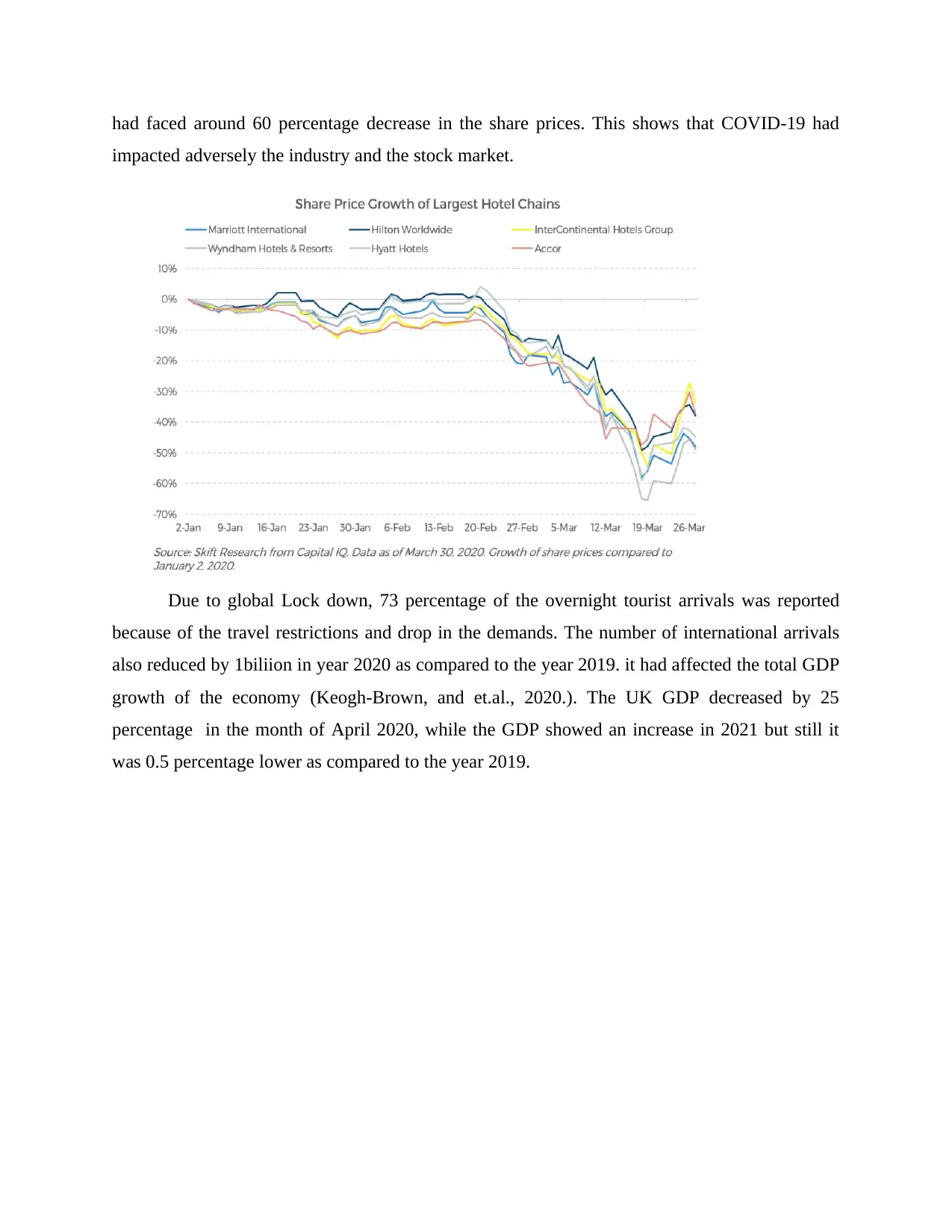
had faced around 60 percentage decrease in the share prices. This shows that COVID-19 had
impacted adversely the industry and the stock market.
Due to global Lock down, 73 percentage of the overnight tourist arrivals was reported
because of the travel restrictions and drop in the demands. The number of international arrivals
also reduced by 1biliion in year 2020 as compared to the year 2019. it had affected the total GDP
growth of the economy (Keogh-Brown, and et.al., 2020.). The UK GDP decreased by 25
percentage in the month of April 2020, while the GDP showed an increase in 2021 but still it
was 0.5 percentage lower as compared to the year 2019.
impacted adversely the industry and the stock market.
Due to global Lock down, 73 percentage of the overnight tourist arrivals was reported
because of the travel restrictions and drop in the demands. The number of international arrivals
also reduced by 1biliion in year 2020 as compared to the year 2019. it had affected the total GDP
growth of the economy (Keogh-Brown, and et.al., 2020.). The UK GDP decreased by 25
percentage in the month of April 2020, while the GDP showed an increase in 2021 but still it
was 0.5 percentage lower as compared to the year 2019.
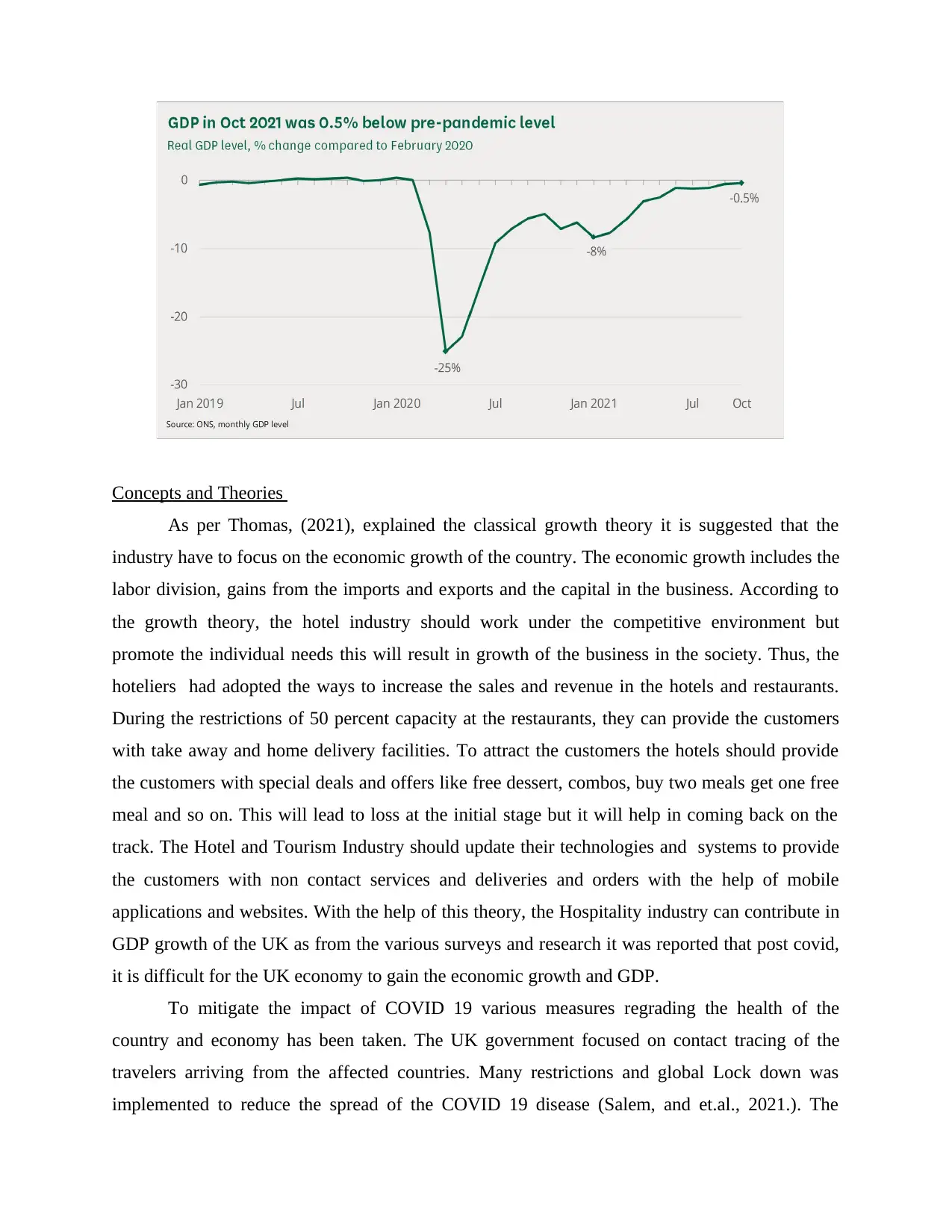
Concepts and Theories
As per Thomas, (2021), explained the classical growth theory it is suggested that the
industry have to focus on the economic growth of the country. The economic growth includes the
labor division, gains from the imports and exports and the capital in the business. According to
the growth theory, the hotel industry should work under the competitive environment but
promote the individual needs this will result in growth of the business in the society. Thus, the
hoteliers had adopted the ways to increase the sales and revenue in the hotels and restaurants.
During the restrictions of 50 percent capacity at the restaurants, they can provide the customers
with take away and home delivery facilities. To attract the customers the hotels should provide
the customers with special deals and offers like free dessert, combos, buy two meals get one free
meal and so on. This will lead to loss at the initial stage but it will help in coming back on the
track. The Hotel and Tourism Industry should update their technologies and systems to provide
the customers with non contact services and deliveries and orders with the help of mobile
applications and websites. With the help of this theory, the Hospitality industry can contribute in
GDP growth of the UK as from the various surveys and research it was reported that post covid,
it is difficult for the UK economy to gain the economic growth and GDP.
To mitigate the impact of COVID 19 various measures regrading the health of the
country and economy has been taken. The UK government focused on contact tracing of the
travelers arriving from the affected countries. Many restrictions and global Lock down was
implemented to reduce the spread of the COVID 19 disease (Salem, and et.al., 2021.). The
As per Thomas, (2021), explained the classical growth theory it is suggested that the
industry have to focus on the economic growth of the country. The economic growth includes the
labor division, gains from the imports and exports and the capital in the business. According to
the growth theory, the hotel industry should work under the competitive environment but
promote the individual needs this will result in growth of the business in the society. Thus, the
hoteliers had adopted the ways to increase the sales and revenue in the hotels and restaurants.
During the restrictions of 50 percent capacity at the restaurants, they can provide the customers
with take away and home delivery facilities. To attract the customers the hotels should provide
the customers with special deals and offers like free dessert, combos, buy two meals get one free
meal and so on. This will lead to loss at the initial stage but it will help in coming back on the
track. The Hotel and Tourism Industry should update their technologies and systems to provide
the customers with non contact services and deliveries and orders with the help of mobile
applications and websites. With the help of this theory, the Hospitality industry can contribute in
GDP growth of the UK as from the various surveys and research it was reported that post covid,
it is difficult for the UK economy to gain the economic growth and GDP.
To mitigate the impact of COVID 19 various measures regrading the health of the
country and economy has been taken. The UK government focused on contact tracing of the
travelers arriving from the affected countries. Many restrictions and global Lock down was
implemented to reduce the spread of the COVID 19 disease (Salem, and et.al., 2021.). The
⊘ This is a preview!⊘
Do you want full access?
Subscribe today to unlock all pages.

Trusted by 1+ million students worldwide
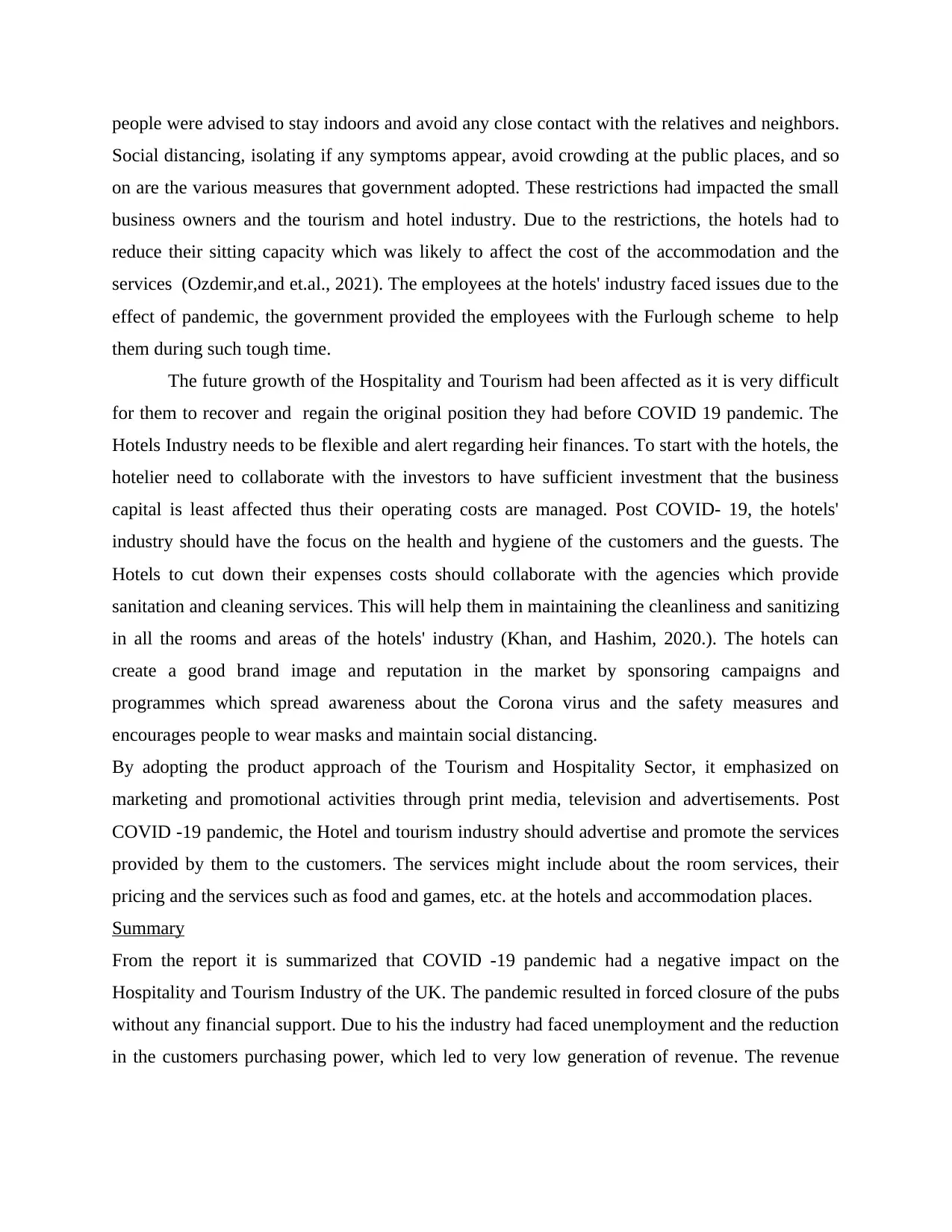
people were advised to stay indoors and avoid any close contact with the relatives and neighbors.
Social distancing, isolating if any symptoms appear, avoid crowding at the public places, and so
on are the various measures that government adopted. These restrictions had impacted the small
business owners and the tourism and hotel industry. Due to the restrictions, the hotels had to
reduce their sitting capacity which was likely to affect the cost of the accommodation and the
services (Ozdemir,and et.al., 2021). The employees at the hotels' industry faced issues due to the
effect of pandemic, the government provided the employees with the Furlough scheme to help
them during such tough time.
The future growth of the Hospitality and Tourism had been affected as it is very difficult
for them to recover and regain the original position they had before COVID 19 pandemic. The
Hotels Industry needs to be flexible and alert regarding heir finances. To start with the hotels, the
hotelier need to collaborate with the investors to have sufficient investment that the business
capital is least affected thus their operating costs are managed. Post COVID- 19, the hotels'
industry should have the focus on the health and hygiene of the customers and the guests. The
Hotels to cut down their expenses costs should collaborate with the agencies which provide
sanitation and cleaning services. This will help them in maintaining the cleanliness and sanitizing
in all the rooms and areas of the hotels' industry (Khan, and Hashim, 2020.). The hotels can
create a good brand image and reputation in the market by sponsoring campaigns and
programmes which spread awareness about the Corona virus and the safety measures and
encourages people to wear masks and maintain social distancing.
By adopting the product approach of the Tourism and Hospitality Sector, it emphasized on
marketing and promotional activities through print media, television and advertisements. Post
COVID -19 pandemic, the Hotel and tourism industry should advertise and promote the services
provided by them to the customers. The services might include about the room services, their
pricing and the services such as food and games, etc. at the hotels and accommodation places.
Summary
From the report it is summarized that COVID -19 pandemic had a negative impact on the
Hospitality and Tourism Industry of the UK. The pandemic resulted in forced closure of the pubs
without any financial support. Due to his the industry had faced unemployment and the reduction
in the customers purchasing power, which led to very low generation of revenue. The revenue
Social distancing, isolating if any symptoms appear, avoid crowding at the public places, and so
on are the various measures that government adopted. These restrictions had impacted the small
business owners and the tourism and hotel industry. Due to the restrictions, the hotels had to
reduce their sitting capacity which was likely to affect the cost of the accommodation and the
services (Ozdemir,and et.al., 2021). The employees at the hotels' industry faced issues due to the
effect of pandemic, the government provided the employees with the Furlough scheme to help
them during such tough time.
The future growth of the Hospitality and Tourism had been affected as it is very difficult
for them to recover and regain the original position they had before COVID 19 pandemic. The
Hotels Industry needs to be flexible and alert regarding heir finances. To start with the hotels, the
hotelier need to collaborate with the investors to have sufficient investment that the business
capital is least affected thus their operating costs are managed. Post COVID- 19, the hotels'
industry should have the focus on the health and hygiene of the customers and the guests. The
Hotels to cut down their expenses costs should collaborate with the agencies which provide
sanitation and cleaning services. This will help them in maintaining the cleanliness and sanitizing
in all the rooms and areas of the hotels' industry (Khan, and Hashim, 2020.). The hotels can
create a good brand image and reputation in the market by sponsoring campaigns and
programmes which spread awareness about the Corona virus and the safety measures and
encourages people to wear masks and maintain social distancing.
By adopting the product approach of the Tourism and Hospitality Sector, it emphasized on
marketing and promotional activities through print media, television and advertisements. Post
COVID -19 pandemic, the Hotel and tourism industry should advertise and promote the services
provided by them to the customers. The services might include about the room services, their
pricing and the services such as food and games, etc. at the hotels and accommodation places.
Summary
From the report it is summarized that COVID -19 pandemic had a negative impact on the
Hospitality and Tourism Industry of the UK. The pandemic resulted in forced closure of the pubs
without any financial support. Due to his the industry had faced unemployment and the reduction
in the customers purchasing power, which led to very low generation of revenue. The revenue
Paraphrase This Document
Need a fresh take? Get an instant paraphrase of this document with our AI Paraphraser
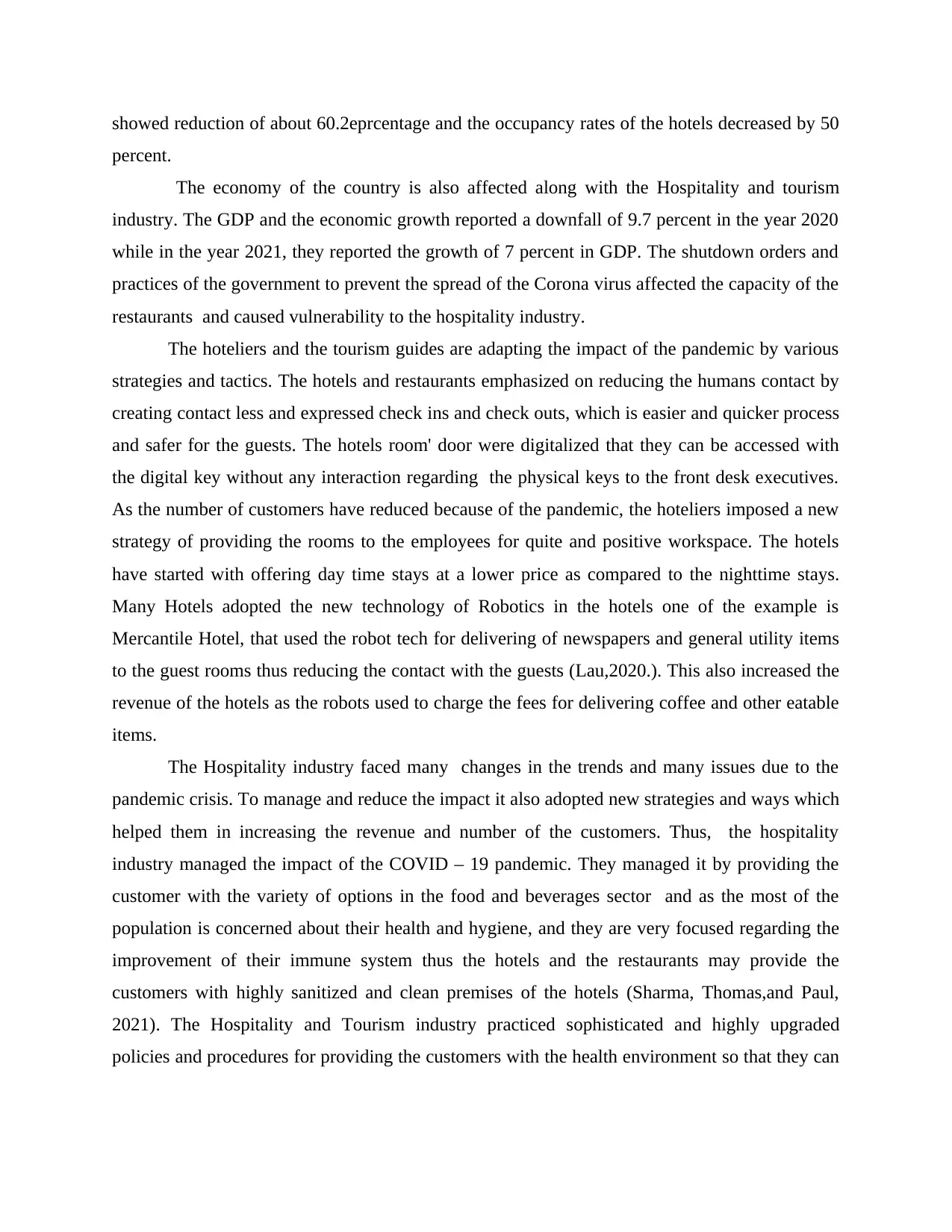
showed reduction of about 60.2eprcentage and the occupancy rates of the hotels decreased by 50
percent.
The economy of the country is also affected along with the Hospitality and tourism
industry. The GDP and the economic growth reported a downfall of 9.7 percent in the year 2020
while in the year 2021, they reported the growth of 7 percent in GDP. The shutdown orders and
practices of the government to prevent the spread of the Corona virus affected the capacity of the
restaurants and caused vulnerability to the hospitality industry.
The hoteliers and the tourism guides are adapting the impact of the pandemic by various
strategies and tactics. The hotels and restaurants emphasized on reducing the humans contact by
creating contact less and expressed check ins and check outs, which is easier and quicker process
and safer for the guests. The hotels room' door were digitalized that they can be accessed with
the digital key without any interaction regarding the physical keys to the front desk executives.
As the number of customers have reduced because of the pandemic, the hoteliers imposed a new
strategy of providing the rooms to the employees for quite and positive workspace. The hotels
have started with offering day time stays at a lower price as compared to the nighttime stays.
Many Hotels adopted the new technology of Robotics in the hotels one of the example is
Mercantile Hotel, that used the robot tech for delivering of newspapers and general utility items
to the guest rooms thus reducing the contact with the guests (Lau,2020.). This also increased the
revenue of the hotels as the robots used to charge the fees for delivering coffee and other eatable
items.
The Hospitality industry faced many changes in the trends and many issues due to the
pandemic crisis. To manage and reduce the impact it also adopted new strategies and ways which
helped them in increasing the revenue and number of the customers. Thus, the hospitality
industry managed the impact of the COVID – 19 pandemic. They managed it by providing the
customer with the variety of options in the food and beverages sector and as the most of the
population is concerned about their health and hygiene, and they are very focused regarding the
improvement of their immune system thus the hotels and the restaurants may provide the
customers with highly sanitized and clean premises of the hotels (Sharma, Thomas,and Paul,
2021). The Hospitality and Tourism industry practiced sophisticated and highly upgraded
policies and procedures for providing the customers with the health environment so that they can
percent.
The economy of the country is also affected along with the Hospitality and tourism
industry. The GDP and the economic growth reported a downfall of 9.7 percent in the year 2020
while in the year 2021, they reported the growth of 7 percent in GDP. The shutdown orders and
practices of the government to prevent the spread of the Corona virus affected the capacity of the
restaurants and caused vulnerability to the hospitality industry.
The hoteliers and the tourism guides are adapting the impact of the pandemic by various
strategies and tactics. The hotels and restaurants emphasized on reducing the humans contact by
creating contact less and expressed check ins and check outs, which is easier and quicker process
and safer for the guests. The hotels room' door were digitalized that they can be accessed with
the digital key without any interaction regarding the physical keys to the front desk executives.
As the number of customers have reduced because of the pandemic, the hoteliers imposed a new
strategy of providing the rooms to the employees for quite and positive workspace. The hotels
have started with offering day time stays at a lower price as compared to the nighttime stays.
Many Hotels adopted the new technology of Robotics in the hotels one of the example is
Mercantile Hotel, that used the robot tech for delivering of newspapers and general utility items
to the guest rooms thus reducing the contact with the guests (Lau,2020.). This also increased the
revenue of the hotels as the robots used to charge the fees for delivering coffee and other eatable
items.
The Hospitality industry faced many changes in the trends and many issues due to the
pandemic crisis. To manage and reduce the impact it also adopted new strategies and ways which
helped them in increasing the revenue and number of the customers. Thus, the hospitality
industry managed the impact of the COVID – 19 pandemic. They managed it by providing the
customer with the variety of options in the food and beverages sector and as the most of the
population is concerned about their health and hygiene, and they are very focused regarding the
improvement of their immune system thus the hotels and the restaurants may provide the
customers with highly sanitized and clean premises of the hotels (Sharma, Thomas,and Paul,
2021). The Hospitality and Tourism industry practiced sophisticated and highly upgraded
policies and procedures for providing the customers with the health environment so that they can
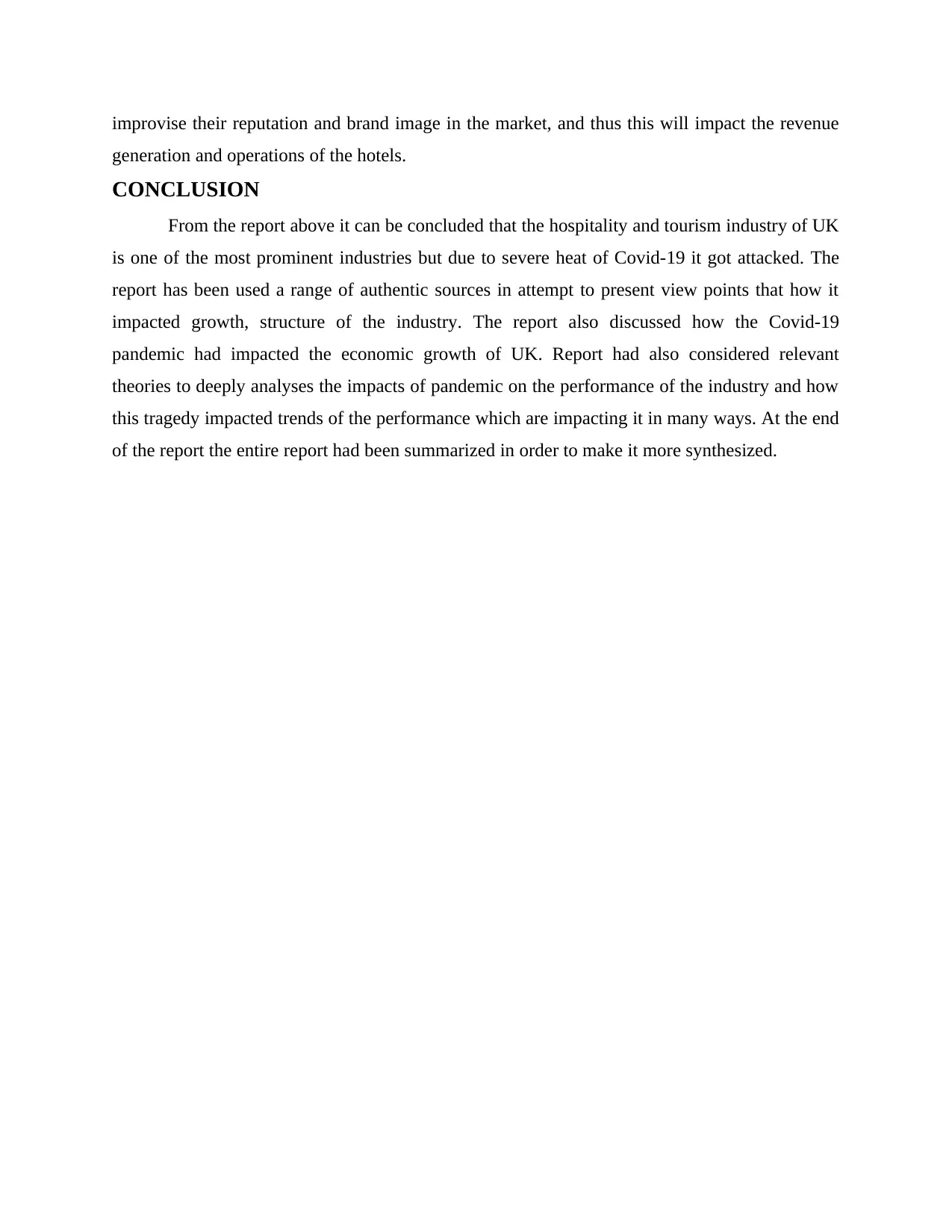
improvise their reputation and brand image in the market, and thus this will impact the revenue
generation and operations of the hotels.
CONCLUSION
From the report above it can be concluded that the hospitality and tourism industry of UK
is one of the most prominent industries but due to severe heat of Covid-19 it got attacked. The
report has been used a range of authentic sources in attempt to present view points that how it
impacted growth, structure of the industry. The report also discussed how the Covid-19
pandemic had impacted the economic growth of UK. Report had also considered relevant
theories to deeply analyses the impacts of pandemic on the performance of the industry and how
this tragedy impacted trends of the performance which are impacting it in many ways. At the end
of the report the entire report had been summarized in order to make it more synthesized.
generation and operations of the hotels.
CONCLUSION
From the report above it can be concluded that the hospitality and tourism industry of UK
is one of the most prominent industries but due to severe heat of Covid-19 it got attacked. The
report has been used a range of authentic sources in attempt to present view points that how it
impacted growth, structure of the industry. The report also discussed how the Covid-19
pandemic had impacted the economic growth of UK. Report had also considered relevant
theories to deeply analyses the impacts of pandemic on the performance of the industry and how
this tragedy impacted trends of the performance which are impacting it in many ways. At the end
of the report the entire report had been summarized in order to make it more synthesized.
⊘ This is a preview!⊘
Do you want full access?
Subscribe today to unlock all pages.

Trusted by 1+ million students worldwide
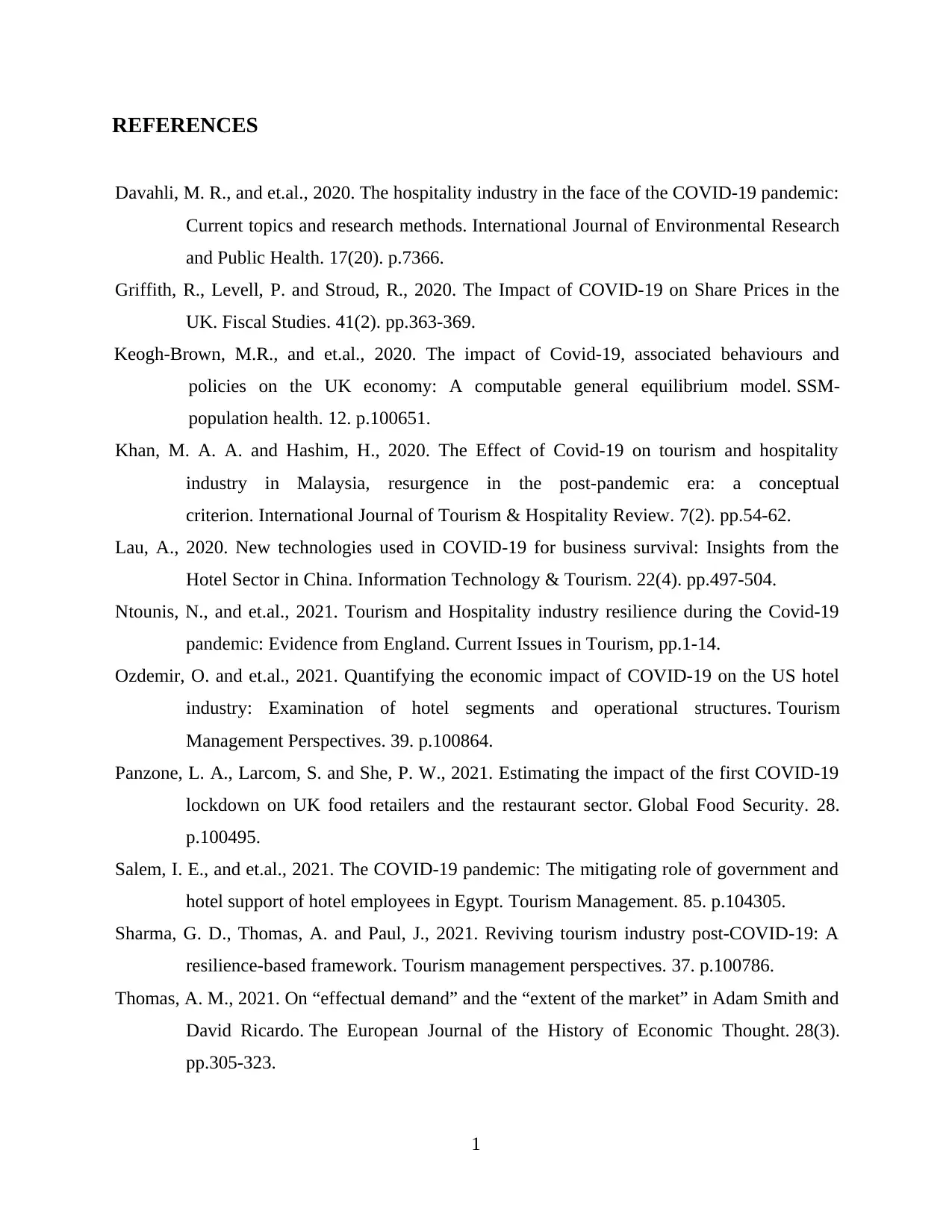
REFERENCES
Davahli, M. R., and et.al., 2020. The hospitality industry in the face of the COVID-19 pandemic:
Current topics and research methods. International Journal of Environmental Research
and Public Health. 17(20). p.7366.
Griffith, R., Levell, P. and Stroud, R., 2020. The Impact of COVID‐19 on Share Prices in the
UK. Fiscal Studies. 41(2). pp.363-369.
Keogh-Brown, M.R., and et.al., 2020. The impact of Covid-19, associated behaviours and
policies on the UK economy: A computable general equilibrium model. SSM-
population health. 12. p.100651.
Khan, M. A. A. and Hashim, H., 2020. The Effect of Covid-19 on tourism and hospitality
industry in Malaysia, resurgence in the post-pandemic era: a conceptual
criterion. International Journal of Tourism & Hospitality Review. 7(2). pp.54-62.
Lau, A., 2020. New technologies used in COVID-19 for business survival: Insights from the
Hotel Sector in China. Information Technology & Tourism. 22(4). pp.497-504.
Ntounis, N., and et.al., 2021. Tourism and Hospitality industry resilience during the Covid-19
pandemic: Evidence from England. Current Issues in Tourism, pp.1-14.
Ozdemir, O. and et.al., 2021. Quantifying the economic impact of COVID-19 on the US hotel
industry: Examination of hotel segments and operational structures. Tourism
Management Perspectives. 39. p.100864.
Panzone, L. A., Larcom, S. and She, P. W., 2021. Estimating the impact of the first COVID-19
lockdown on UK food retailers and the restaurant sector. Global Food Security. 28.
p.100495.
Salem, I. E., and et.al., 2021. The COVID-19 pandemic: The mitigating role of government and
hotel support of hotel employees in Egypt. Tourism Management. 85. p.104305.
Sharma, G. D., Thomas, A. and Paul, J., 2021. Reviving tourism industry post-COVID-19: A
resilience-based framework. Tourism management perspectives. 37. p.100786.
Thomas, A. M., 2021. On “effectual demand” and the “extent of the market” in Adam Smith and
David Ricardo. The European Journal of the History of Economic Thought. 28(3).
pp.305-323.
1
Davahli, M. R., and et.al., 2020. The hospitality industry in the face of the COVID-19 pandemic:
Current topics and research methods. International Journal of Environmental Research
and Public Health. 17(20). p.7366.
Griffith, R., Levell, P. and Stroud, R., 2020. The Impact of COVID‐19 on Share Prices in the
UK. Fiscal Studies. 41(2). pp.363-369.
Keogh-Brown, M.R., and et.al., 2020. The impact of Covid-19, associated behaviours and
policies on the UK economy: A computable general equilibrium model. SSM-
population health. 12. p.100651.
Khan, M. A. A. and Hashim, H., 2020. The Effect of Covid-19 on tourism and hospitality
industry in Malaysia, resurgence in the post-pandemic era: a conceptual
criterion. International Journal of Tourism & Hospitality Review. 7(2). pp.54-62.
Lau, A., 2020. New technologies used in COVID-19 for business survival: Insights from the
Hotel Sector in China. Information Technology & Tourism. 22(4). pp.497-504.
Ntounis, N., and et.al., 2021. Tourism and Hospitality industry resilience during the Covid-19
pandemic: Evidence from England. Current Issues in Tourism, pp.1-14.
Ozdemir, O. and et.al., 2021. Quantifying the economic impact of COVID-19 on the US hotel
industry: Examination of hotel segments and operational structures. Tourism
Management Perspectives. 39. p.100864.
Panzone, L. A., Larcom, S. and She, P. W., 2021. Estimating the impact of the first COVID-19
lockdown on UK food retailers and the restaurant sector. Global Food Security. 28.
p.100495.
Salem, I. E., and et.al., 2021. The COVID-19 pandemic: The mitigating role of government and
hotel support of hotel employees in Egypt. Tourism Management. 85. p.104305.
Sharma, G. D., Thomas, A. and Paul, J., 2021. Reviving tourism industry post-COVID-19: A
resilience-based framework. Tourism management perspectives. 37. p.100786.
Thomas, A. M., 2021. On “effectual demand” and the “extent of the market” in Adam Smith and
David Ricardo. The European Journal of the History of Economic Thought. 28(3).
pp.305-323.
1
1 out of 10
Related Documents
Your All-in-One AI-Powered Toolkit for Academic Success.
+13062052269
info@desklib.com
Available 24*7 on WhatsApp / Email
![[object Object]](/_next/static/media/star-bottom.7253800d.svg)
Unlock your academic potential
Copyright © 2020–2026 A2Z Services. All Rights Reserved. Developed and managed by ZUCOL.




